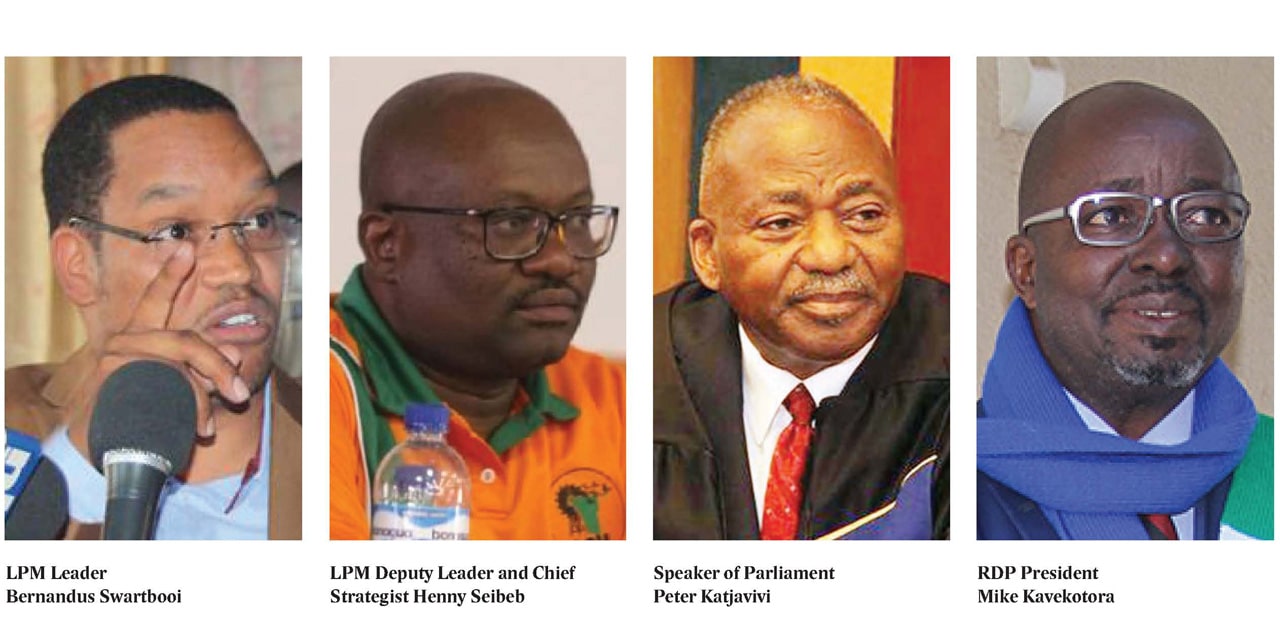Andrew Kathindi
The High Court’s decision to dismiss the Landless People’s Movement’s (LPM) application to set aside Speaker of Parliament, Peter Katjavivi’s indefinite suspension of Bernandus Swartbooi and Henny Seibeb could set a worrying precedent.
These were the views of Rally for Democracy and Progress (RDP) President Mike Kavekotora, who sits on the Parliamentary Standing Committee on Standing Rules and Orders and Internal Arrangements (STROC). The STROC according to parliament’s spokesperson, David Nahogandja, generally deals with matters such as misconduct before it is brought before the Privileges Committee.
Kavekotora claimed that Katjavivi lied when he said the matter was dealt with by STROC, which the RDP president says never sat on the matter.
“It’s surprising that the court took such a decision. Katjavivi does not have the power to suspend anyone indefinitely. He can only suspend for that session, for that day. Katjavivi did not follow the correct procedures. He did not consult, he just went ahead and suspended,” he said.
According to Kavekotora, the judgement should have been a clear-cut case, in favour of LPM MPs, stating that Katjavivi failed to follow the right procedures. “I am worried about our justice system. This is a mockery of our democracy. It creates a precedence that they can do whatever they want and they will be protected by law. The Speaker took a decision without convening a committee. I am part of the standing rules committee along with leader of the Popular Democratic Movement (PDM), McHenry Venaani. Neither the committee nor Privileges Committee was consulted before the Speaker took his decision,” RDP president said.
Judge Kobus Miller on Thursday referred the matter back to Parliament to be dealt with internally.
This comes as Swartbooi and Seibeb were forcibly removed from Parliament on the 15th of April after being judged as disruptive during a Question and Answer session following President Hage Geingob’s State of the Nation address.
Kavekotora questioned the High Court decision arguing, “How can they say the matter should be dealt with internally when omission of internal procedures is what led the two MPs to court? The process was not followed.”
Political analyst, Dumba Kamwanya, concurred with Kavekotora’s sentiments, stating that from a political perspective, it was a very problematic ruling. “As far as I know they did not appear before a committee responsible for disciplinary hearing, so what are you suspending them for? So, to that extent, it was an overreach by the Speaker, in terms of following proper procedure. The indefinite is problematic,” he said.
“It does infringe on our democratic process, if you take it from a political perspective, but if you take it from the three branches of government, they have the right to rule in that way.”
Official opposition leader, McHenry Venaani, who also serves as Parliament’s Privileges Committee Vice Chairperson, has previously accused Parliament of keeping him in the dark about what was to happen to the suspended MPs.
Swartbooi questioned Miller’s decision, further accusing the High Court of giving Parliament time to legitimise its suspension of the LPM MPs.
“He basically avoids to deal with the core question that we’ve asked, which is, does the Speaker have the power in terms of rule 124, to withdraw members of a party as he did? And all he says is there are internal processes ongoing,” the LPM Leader said.
“But remember, the urgent application was made on the Friday, he postponed it to Tuesday, to give respondents time, during that period, the respondents on Monday generated a process, which was even incorrect, which they are continuing with. When we made the urgent application, there was no court process, we were challenging a decision taken by the Speaker without due process.”
On Thursday morning, the LPM application was dismissed with costs.
“The applicants are ordered jointly and severally to pay the respondents costs, which will include the costs of one instructing and one instructed counsel,” stated Judge Miller.
“It is important in that regard to consider that there are other remedies available to the applicant as I attempted to demonstrate. Nothing prohibits the applicants from raising the issues raised before me in the course of the internal proceedings pending against them.”
This comes as the Committee of Privileges on 5th May decided to schedule a hearing of the matter on the 18th May.
“The hearing will involve hearing evidence from various persons present in the National Assembly Chamber on the 15th of April 2021. This hearing, as per the Standing Rules and Orders and Internal Arrangements of the National Assembly, will not be open to the Public other than the persons invited for the purposes of the hearing, the Committee Members and staff members attached to the Committee,” Parliament stated.




